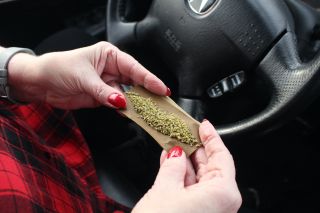ADDICTION- Cannabis Addiction Is a Treatable Medical Condition. Therapy and medications exist, but few receive them. Reviewed by Devon Frye

KEY POINTS-
- Cannabis is a drug with a similar addictive potential to alcohol.
- Unlike with alcohol use disorder, our society has failed to confront the reality of cannabis use disorder.
- As with AUD and other addictions, therapy and medications can be utilized for CUD.
- Broader recognition of CUD is essential to ensure access to treatment for those who need it.

Cannabis addiction is a real and treatable medical condition. If you had to read that sentence twice, it might be because the cannabis legalization movement has successfully pushed back the decades of fearmongering about the harms of the drug that led to mass incarceration.
Indeed, cannabis does not turn people into criminals, and it is a victory that the vast majority of Americans no longer believe its use should be criminalized. But that does not mean we should shut our eyes to cannabis’s addictive potential—or deny help to people struggling to stop using the drug.
A national survey found that about 13 percent of people who try cannabis even once by age 14 eventually develop addiction, clinically known as cannabis use disorder (CUD). The figure mirrored that for alcohol: 16 percent of those who take a drink by age 14 go on to have alcohol use disorder (AUD). Among those who use cannabis more regularly, between one-fifth and one-third have CUD. Just under a third of the general population develops AUD in their lifetime.
If these parallels surprise you, you are not alone: many people perceive cannabis as less harmful than alcohol. The false notion that cannabis is “natural” and therefore nonaddictive is pervasive.
How Is Cannabis Addiction Defined?
To shake the collective disavowal of cannabis addiction, it helps to understand the clinical paradigm of all drug addictions, or substance use disorders (SUDs). The hallmarks of SUD are categorized as the three Cs: cravings (strong desire to use the drug), consequences (negative consequences of use), and loss of control (continuing to use despite the consequences). Tolerance (needing more of the drug to experience the same effects) and withdrawal (physical and/or psychological distress when the drug is stopped) are two other diagnostic criteria. A person who meets two or three criteria is considered to have a mild SUD; four or five, moderate; and six or more, severe.

Mild CUD might look like using more cannabis over time and getting into a fender-bender after driving under the influence of cannabis (this nearly doubles the risk of car accidents), without other problems. A more severe case could involve experiencing recurrent harms from cannabis use, such as worsening of underlying depression after the initial high wears off, yet continuing to use the drug due to cravings and inability to fall asleep without it.
It is heartening that the prevalence of cannabis addiction among U.S. adults remained below 2 percent from 2002 to 2017, even as cannabis use increased from 10 to 15 percent. Those who used cannabis actually became less likely to meet criteria for CUD.
This phenomenon may be due to increased social acceptability of cannabis use; people are less likely to be labeled as addicted to a substance when its use does not result in loss of their job or friction in their relationship. Destigmatizing cannabis use, much like decriminalizing it, is a desired social outcome. However, it has come at the expense of engagement in treatment, with only 4 percent of people with CUD receiving treatment in 2019 vs. 9 percent in 2002.
How Can Cannabis Use Disorder Be Treated?
Evidence-based therapies for CUD include cognitive behavioral therapy (CBT), motivational enhancement therapy (MET), and contingency management (CM). CBT involves identifying triggers for cannabis use and building coping skills to prevent triggers from leading to use. In MET, the therapist employs empathy and reflective listening to guide the patient to change their use behavior. CM offers incentives such as cash or vouchers to positively reinforce abstinence from cannabis.
A meta-analysis linked CBT and MET to a one-quarter to one-third reduction in cannabis use over an average of four months of follow-up. Combinations of CBT, MET, and CM may be even more effective. While they have not been shown to produce long-term benefits, these psychosocial interventions have comparable efficacy for CUD as for AUD and major depression. If we encourage people to go to therapy to help with their drinking or depression, we can do the same for those suffering from CUD—and have similar hope that they will get better.
Unlike with AUD and depression, no medication is yet FDA-approved for CUD, but a few have shown promise. N-acetylcysteine (NAC), an antioxidant with calming properties that may reduce cannabis cravings, has some evidence for promoting abstinence, particularly in adolescents and young adults. It is available over the counter and has few side effects. If you or your loved one is trying to stop or reduce cannabis use, consult with a primary care provider about NAC; they can check for any interactions with other medications.
Similarly, you can talk to your doctor about a prescription for a medication with off-label evidence for CUD, as many of these medications are commonly prescribed for other conditions. For example, varenicline, which is FDA-approved for smoking cessation, helped reduce cannabis use in one small study. Topiramate, an anti-seizure drug, and gabapentin, which is utilized for various mental health conditions, are other options. Caution is advised with gabapentin, as it can be addictive itself. While current evidence for these pharmacotherapies is limited, they are reasonable to try, until data points to the most effective treatment and treatment becomes readily available.

Tragically, many have sought help for CUD only to feel dismissed by the healthcare system. Mutual help groups, such as Marijuana Anonymous (MA), may fill a gap for those who cannot access professional treatment. Though they have not been rigorously studied, MA meetings are easily found in major cities and provide a supportive community.
Even as the pendulum has swung from demonizing cannabis to glorifying it, people with CUD have consistently been denied treatment, either because they were placed behind bars or because their symptoms were trivialized. Yet like other types of SUD, CUD is a medical condition that can be addressed with therapy, medication, and peer support groups. Research is ongoing to identify the optimal treatment regimen. While awaiting additional guidelines, we can all do our part to recognize CUD and advocate for people living with CUD to obtain treatment.
- Questions and Answers
- Opinion
- Motivational and Inspiring Story
- Technology
- Live and Let live
- Focus
- Geopolitics
- Military-Arms/Equipment
- Sicurezza
- Economy
- Beasts of Nations
- Machine Tools-The “Mother Industry”
- Art
- Causes
- Crafts
- Dance
- Drinks
- Film/Movie
- Fitness
- Food
- Giochi
- Gardening
- Health
- Home
- Literature
- Music
- Networking
- Altre informazioni
- Party
- Religion
- Shopping
- Sports
- Theater
- Health and Wellness
- News
- Culture

